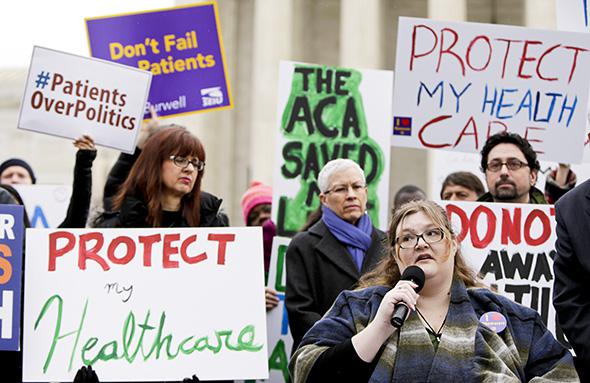During the oral argument in King v. Burwell on Wednesday, at least some of the Supreme Court justices seemed concerned about the consequences of a ruling against the government. Largely unstated was the most dramatic likely consequence of such a ruling: Citizens in blue states would continue to have major federal income tax breaks that are not available to their fellow citizens who live in red states. The result would be an extraordinary and anomalous federal tax regime. Moreover, it is one that neither Congress nor the states would be likely to cure, at least not in the foreseeable future.
First, a ruling against the government would not be a national disaster for Obamacare. It would be a disaster, to be sure, but basically only in red states in which conservative politicians might find it politically impossible to set up state-run insurance exchanges. Obamacare is doing just fine in the states that have established their own exchanges. They may be fewer than a third of the states by number, but they include major jurisdictions such as California and New York. And they are likely to be joined by a few other major states such as Pennsylvania where the politics will allow the establishment of state exchanges.
If the court’s majority were to rule against the government, I would guess that when all this shakes out over the next year, states with (very roughly) half the population would have well-functioning health insurance markets because the working-class citizens in those states would be entitled to federal income tax subsidies enabling them to purchase affordable health insurance. Almost all of the states whose citizens will continue to receive those hundreds of millions of dollars in health insurance subsidies will be blue states. In most red states, the dollar amount of the subsidies would be zero, and the private insurance market would collapse.
Some have suggested that Congress would fix this problem. But what is the basis for that confidence? If funding Homeland Security is a problem for this Congress, why would one expect it to agree on a new health care regime? The complexity of such an endeavor alone would make final passage an unlikely event, and the deep divisions within the Republican Party on what to do would make it impossible. Senators and representatives from red states whose citizens would lose the tax breaks would ordinarily be expected to lead the legislative charge. They, however, are the very members who would be under enormous pressure to vote against any proposal that would “fix” and not “repeal” the dreaded Obamacare.
That would place the issue in the hands of the states. Even though creation of state exchanges would be supported by a broad coalition (doctors, hospitals, insurance companies, and working-class citizens who need the subsidies to help buy insurance), there are likely to remain states whose most conservative activists would block action in at least one branch of their legislatures.
One might ask, of course, how anyone would think that Congress could possibly have intended a system in which blue-state citizens get federal tax breaks that are denied to red-state citizens. The great irony of a victory for the challengers in King is that federal taxpayers would still receive the subsidies essential for a viable health insurance market, but only if they lived in states that—give or take a few—voted for Obama. That would give a new meaning to the term Obamacare.
